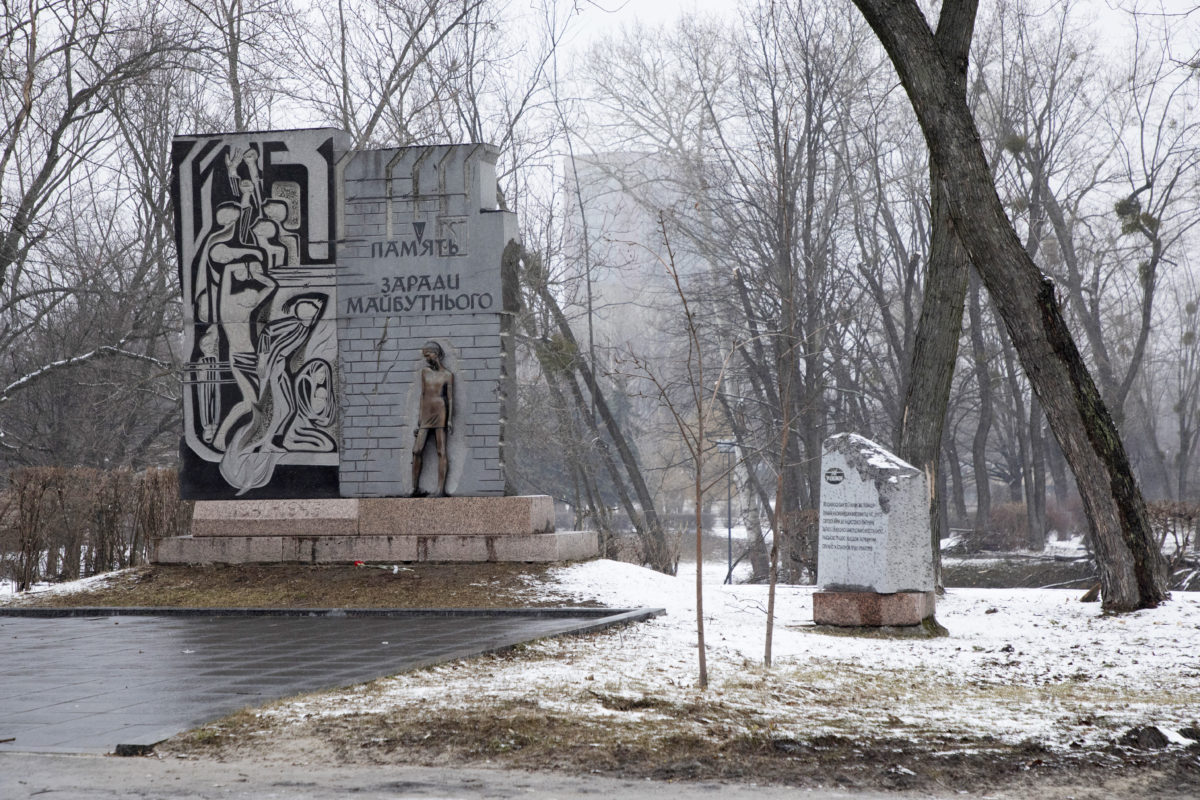Your Daily Phil: A new tool to help orgs prevent misconduct + From Holocaust memory to refugee aid in Poland
Good Tuesday morning!
In recent years, a number of Jewish institutions across the ideological spectrum have confronted allegations of sexual misconduct. And in many of those cases, victims say they tried to report the alleged abuse — only for their complaint to go nowhere.
Now, Sacred Spaces, a Jewish organization that combats sexual abuse, is unveiling a set of policies Jewish groups can use to try to prevent misconduct and address it when it happens, eJewishPhilathropy has learned. The organization hopes that having clear language and regulations will lead to a cultural shift around the fraught set of issues.
“Whatever your institution is, you’re dealing with a million things, including the very thing you were created to do, so to start to draft your forms and your protocols and all of this, when this isn’t your expertise — you probably don’t have the capacity to do this all on your own,” Shira Berkovits, Sacred Spaces’ president and CEO, told eJP. She added, “I don’t think we’re all doing our best, because doing our best means putting in place a system before there’s a problem.”
The set of policies, called Keilim (Hebrew for “tools” or “vessels”), includes six sections — ranging from “Prohibited Conduct,” which helps organizations define unacceptable behavior; to “Screening,” which covers hiring practices; to “Organizational Response,” which covers how groups should act when allegations emerge. “Prohibited Conduct,” “Organizational Response” and an initial section called “Foundational Values” are all launching today. The three additional sections will go online in the fall.
Much of the project’s content isn’t explicitly Jewish. The bulk of the material involves technical language concerning sexual misconduct, discrimination or bullying that would fit in just as well in a non-Jewish organization’s employee handbook. But the project is interspersed with Jewish language, including a d’var Torah, and adjusts its word choice to include terms like “lay leaders,” “funders” and “rabbis.” Beyond that, Berkovits feels there’s value in presenting the policies in a Jewish context.
“If this material — the ideas of safety, respect and equity — if you’re like, ‘We’ll just take the legal terminology,’ or, ‘This doesn’t have to be our Jewish values,’ what kind of message is that?” she said. “Of course our Jewish values need to inform every decision we make on this because this goes to the core of treating human beings in the image of God.”
LIVING HISTORY
For Holocaust educators in Poland, the war in Ukraine is more than just a teachable moment


LAURENT VAN DER STOCKT FOR LE MONDE/GETTY IMAGES
On the day the Russian army invaded Ukraine last month, Anna Niedzwiedz, a citizen of neighboring Poland, noticed a post on Facebook requesting shelter for a family from Kyiv that was fleeing the violence. She responded immediately. “I sent a message saying that I have space in my house, and they are very welcome,” the Krakow resident told Jewish Insider’s Ruth Marks Eglash. “I then called my husband to tell him.”
Lessons from the past: It was that phone call – as well as Anna’s act of pure kindness – that set into motion a series of events drawing a direct line between the chaos and inhumanity of the past few weeks in Eastern Europe and the forces of past horrors in the same area. Anna’s husband, Wojtek, has worked for years as a security guard for JRoots, an organization that runs Holocaust educational trips to Poland, as well as other places of significant Jewish heritage. Her call to him on that day sparked the interest and compassion of the nonprofit, propelling its leaders to re-channel its regular activities into helping some of the more than 2 million Ukrainian refugees who have poured across the border into Poland. The group of educators is now putting into practice lessons that they have been imparting for years to thousands of visitors from all over the world.
Helping hand: “When this kicked off, we couldn’t just sit down and do nothing,” Tzvi Sperber, founder and director of JRoots, told JI. “We had been teaching about the Righteous Among the Nations and other lessons of the Holocaust, so we had to do something.” With a broad infrastructure and manpower already in place in Poland, including contacts in the hotel industry, bus drivers and tour guides, Sperber said it was fairly easy for the organization to pivot its efforts into helping those in need and, almost immediately, the organization’s vast network of alumni responded with support, both financial and otherwise.
Essential aid: Since the war began on February 24, the group has helped to provide food, clothing, medicine and other essential items to one of the largest distributions centers in Krakow, assisted in turning the Galicia Jewish Museum in Krakow — which commemorates Holocaust victims and celebrates Polish Jewish culture — into a daycare center for refugee children and helped to convert the lower floor of the Chachmei Lublin Yeshiva in Lublin into a refugee center. “Most of the refugees are women and children,” Sperber described, adding that the help they are giving is not limited to Jewish refugees. “The whole situation is just so heartbreaking and catastrophic on a humanitarian level.”
CHALLENGES AHEAD
10 fears Jewish professionals experience, and how we can face them together


GR Stocks/Unsplash
“As a Jewish educator, most days, I arrive at my office excited and energized about the opportunities to try to make a meaningful impact. But I must confess: On other days, I come to work carrying anxiety and fear about the enormity of the challenges ahead… The amount of fear that Jewish communal professionals live with is detrimental to our own health, our loved ones and the good we seek to do in the world,” writes Rabbi Shmuly Yanklowitz, president & dean of Valley Beit Midrash in Scottsdale, Ariz., in an opinion piece for eJewishPhilanthropy.
Common themes: “In my conversations with rabbis, cantors, schoolteachers, nonprofit executive directors and all other kinds of Jewish professionals around the country, I’ve found… common themes around the gripping fear that inhibits us from doing our best work today.”
Physical danger: “In light of the tragic attacks in Squirrel Hill in Pittsburgh; Colleyville, Texas; and Poway, Calif. — as well as the overall rising tide of antisemitism — fear that something similar may happen to us, our colleagues and our community members is a burden we are forced to carry with us every day.”
Politics of COVID policies: “Week in and week out, we are forced to make decisions about how our organizations are going to handle COVID: what the masking-and-distancing situation will be, how to enforce vaccination requirements and whether it’s safe to gather together at all. These decisions necessarily upset portions of our communities, and there is no way to satisfy everyone. As CDC guidelines evolve in one direction or the other, we are expected to suddenly shift psychologically and procedurally.”
EMERGENCY RESPONSE
Helping Ukraine: How philanthropists and foundations can take action


Courtesy
“The humanitarian crisis in Ukraine is heart-wrenching and complex. In many respects, it’s similar to a natural disaster but it also poses distinct challenges that require both immediate and long-term support,” writes Gillian Howell, head of client advisory solutions for Foundation Source, in an opinion piece for eJewishPhilanthropy.
Funder advantage: “Philanthropists, especially those with private foundations, are able to help in more agile and flexible ways that others cannot. Not only can they respond rapidly when a crisis occurs, they can also take a longer view to understand the full scope of the problem(s), pinpoint where they can make the greatest impact and determine how to allocate their resources most effectively to boost established relief efforts and/or spawn new ones.”
The ‘disaster life cycle’: “Crisis and disaster response happens in several stages. By distributing funds and support across the ‘disaster life cycle,’ philanthropists may be able to achieve greater impact with their resources and reduce the likelihood of recurrence while also aligning their response with their values and giving priorities.”
Read the full piece here.
Worthy Reads
We’d Like to Thank the Academy: After criticism over the omission of Jews from its galleries, the Academy Museum of Motion Pictures will open an exhibition on the industry’s early days next spring, including the many contributions made by Jews, Adam Nagourney writes in The New York Times: “[The] new permanent exhibition next spring [will be] devoted to the origins of Hollywood, and specifically the lives and contributions of the Jewish studio founders who were largely responsible for creating the world that is being celebrated by the sellout crowds flocking to the new museum. [Museum director Bill] Kramer said in an interview that the Academy Museum had always intended to open a temporary gallery devoted to the subject. ‘We’ve long had this on our list to do, and we knew this was going to be in our first rotations…Representation is so important. We heard that and we take that seriously. When you talk about the founding of Hollywood studios, you’re talking about the Jewish founders.’” [NYTimes]
Small Museum Struggles: The 9/11 Tribute Museum, a small museum that opened at Ground Zero years before — and is much smaller than — the National September 11 Memorial & Museum, may soon close due to financial difficulties, Jennifer Peltz reports in The Associated Press. “The Tribute Museum has gotten grants and donations but relies heavily on admission and tour fees…It exhibited twisted steel from the wreckage, a photo gallery of victims, and other artifacts. But it became best known for walking tours of the trade center site, led by relatives of the dead, survivors, rescue and recovery workers and people who lived nearby on 9/11. The center drew 100,000 visitors just in its first four months. Over the years, it also has provided over 900 volunteer tour guides with a cherished outlet for their grief, pain and memories. The center was dwarfed by the National September 11 Memorial & Museum, a $700 million, taxpayer-subsidized project that opened its memorial plaza in 2011 and a vast underground museum in 2014. The museum alone has drawn more than 18 million visitors and the open-air, un-ticketed plaza an estimated 55 million.” [AP]
Community Comms
Be featured: Email us to inform the eJP readership of your upcoming event, job opening, or other communication.
Word on the Street
Hebrew Union College-Jewish Institute of Religion’s board will consider a proposal at its April meeting to cease enrolling rabbinic students at its Cincinnati campus. The campus has been ordaining rabbis since 1875…
The U.K. Charity Commission opened a statutory inquiry into Genesis Philanthropy Group after three of its founding trustees were made subject to financial sanctions. The regulator has frozen the charity’s bank account, meaning no one can access or move funds held in its account without the commission’s prior consent…
The U.K.-based World Jewish Relief informed the Jewish Board of Deputies that the organization has rescued 15,000 people so far from the war in Ukraine…
Medcase, a network of clinicians, is partnering with local and international organizations to provide on-the-ground and virtual medical assistance for Ukrainian refugees fleeing to Poland and Romania as part of its Medcase For Good initiative…
The co-founders of the online lodging company Airbnb together pledged to match up to $10 million in contributions from other donors to provide free short-term housing to refugees fleeing war-torn Ukraine…
UJA-Federation of New York announced a new round of emergency funding to address urgent humanitarian needs of people remaining in Ukraine as well as refugees. Since Feb. 24, when Russia invaded Ukraine, UJA has made $8.1 million in grants to assist Ukrainians…
A quarter of Americans who are aware of the Russian invasion of Ukraine have taken action to support Ukraine, including making donations to charity or other forms of economic support, according to a survey from Fidelity Charitable…
Singapore will open an embassy in Israel, more than a half-century after the two countries established diplomatic ties…
Middlebury College in Vermont received a $25 million grant to create a cross-disciplinary program focused on conflict transformation from a donor who prefers to remain anonymous. The grant is the largest curriculum-specific gift in the school’s history…
Daughters for Earth launched a $100 million campaign in support of women-led efforts to protect and restore the Earth…
Pic of the Day


Courtesy of FIDF
The Chicago-based Herrendorf Family Foundation partnered with Friends of the Israel Defense Forces to construct a sports facility at an IDF Intelligence Unit Base. The foundation donated some $4.5 million towards the development and finalization of the 16,000-square-foot sports center – which was recently completed — to support the well-being of the soldiers of the elite 8200 Unit of the IDF, providing them with a recreational outlet and event hall.
Birthdays


Coppola/Getty Images for WarnerMedia
Anchor of CNN’s “The Situation Room,” Wolf Blitzer…
Professor emeritus of education and humanities at the University of Virginia and founder and chairman of the Core Knowledge Foundation, E.D. Hirsch… “Star Trek’s” Capt. Kirk, in 2021 he flew to space aboard a Blue Origin suborbital capsule, William Shatner… Twice elected as Mayor of Beverly Hills, Jamshid “Jimmy” Delshad… Dentist in Norwalk, Conn., Murray Bruckel… Academy Award-winning screenwriter, his work includes “Forrest Gump” and “The Curious Case of Benjamin Button,” Eric Roth… Israeli viola player and teacher, Rivka Golani… Aviation and aerospace professional, Mike Orkin… Owner of the NHL’s Tampa Bay Lightning, Jeffrey N. Vinik… Popular musical entertainer in the Orthodox Jewish community, Avraham Shabsi Friedman, better known by his stage name, Avraham Fried… Director of communications at The Jewish Theological Seminary, Andrea Glick… Former corporate secretary, EVP and general counsel at Hertz Corporation, J. Jeffrey Zimmerman… Retired Israeli basketball player, she is in the Guinness Book of World Records for the most points (136) ever scored in a women’s professional game, Anat Draigor… Award-winning defense correspondent who has covered Israel and the Middle East, Arieh O’Sullivan… Journalist and writer Debra Nussbaum Cohen… Head of real estate for Mansueto Office, Ari Glass… Managing director of Mercury Public Affairs, Jonathan Greenspun… SVP at HCA Healthcare, Jeff E. Cohen… Judge of the United States Court of Appeals for the District of Columbia Circuit, Judge Neomi Rao… Founder of Barstool Sports, David Portnoy… Visual editor at The City, Ben Fractenberg… Senior advisor at both Fenway Strategies and Emerson Collective, Adam Perecman Frankel… Founder and CEO of Into The Gloss and Glossier, Emily Weiss… Creator of the Yehi Ohr program at Jewish Community Services of South Florida, Zisa Levin… Retired MLB first baseman, Isaac Benjamin “Ike” Davis… Communications director for U.S. Sen. Jon Tester (D-MT), Sarah Alice Frank Feldman… Energy policy and climate change reporter for Politico, Joshua Adam Siegel… Director of the Dan David Prize, Charlotte Hallé... Interim director of communications at the U.K.’s department of health and social care, James Sorene… Beatrice Stein… Program officer at the Diane and Gilford Glazer Foundation, Molly Dehrey-Buckman, LCSW…








